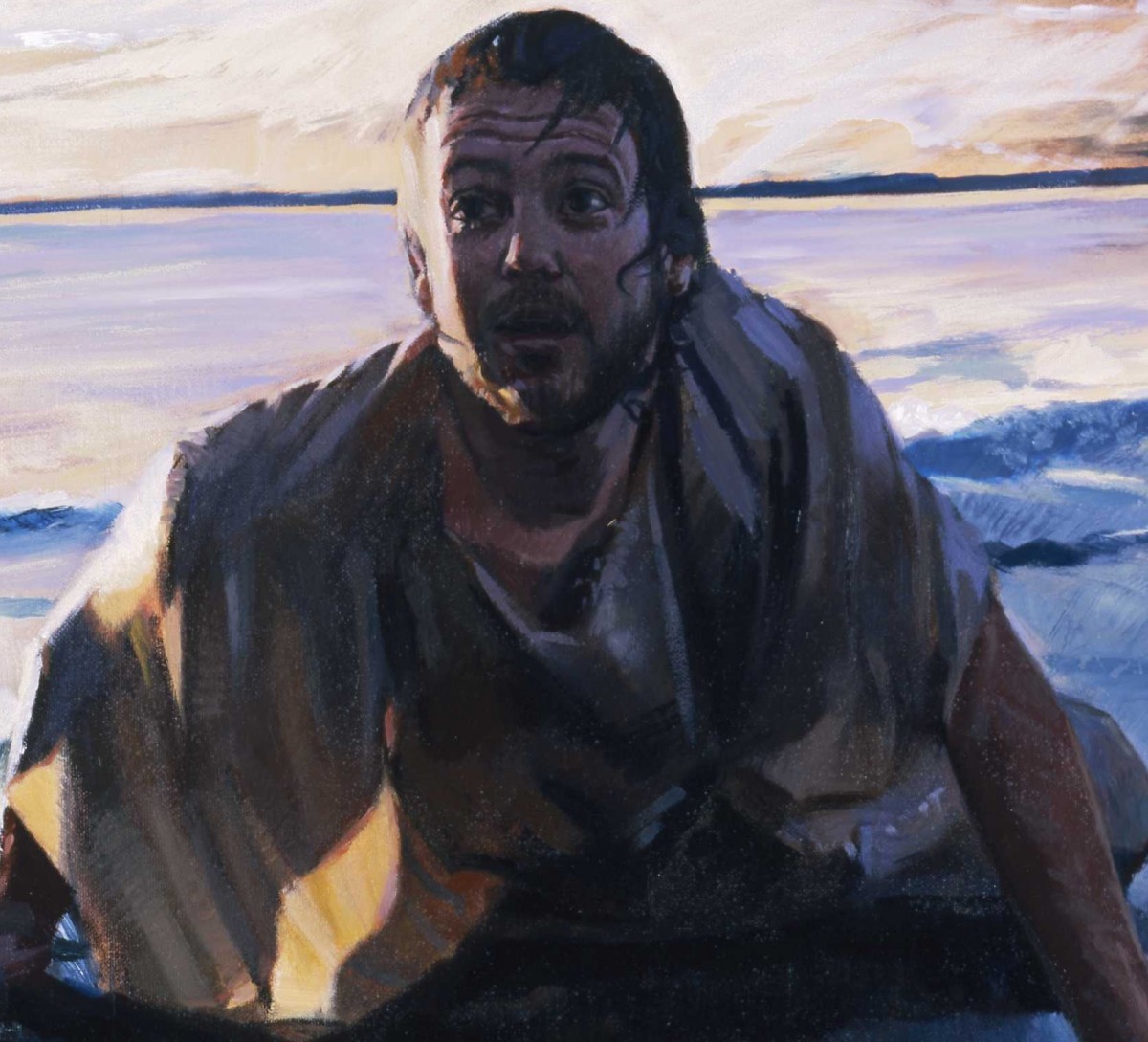Background Passages: Jonah 1:1-4:11; John 3:16; Matthew 9:36
The stranger boarded the last boat to Tarshish.
Incognito.
Cloak pulled tightly around his shoulders.
Face hooded and hidden.
Mysterious.
With a furtive glance to the east,
he slipped below deck without a word.
Secretive.
“Paid his fare,” the Captain said.
“Don’t ask questions.
Let him be.”
Enigmatic.
Jonah, a man of God,
a fugitive fighting a deep burden of guilt.
How did it come to this?
*****
Israel.
His home. His country.
Ruled by Jeroboam II,
sinful and self-centered like its king,
but regaining military strength.
Misinterpreted God’s leniency
for God’s approval.
Nineveh.
A great city. Powerful and ruthless.
Capital of cruelty.
Wicked and wasteful.
Brutal and bloodthirsty.
Arrogant and aggressive.
Jonah.
Israel personified.
Zealously patriotic.
Lover of his country and its people.
His people.
National pride blinded faith.
Quick to offer God’s grace to the Hebrews.
Slow to offer God’s grace to an ancient enemy.
Provincial.
Predictable.
Prejudiced.
Jonah wrapped his existence in the Hebrew’s
special relationship with God,
the Father.
He lived in a resurgent nation
under imminent threat from the dreaded Assyrians.
That was his world.
Entitled.
Infallible.
In denial.
*****
God said to Jonah,
“Go to Nineveh.
Cry out against it for I have seen their wickedness.”
It sounded simple enough.
Grab your passport,
take a trip.
Admonish their sin.
Call them to turn from evil.
Show God’s mercy.
Encourage them.
Help them survive.
But Jonah heard,
“My blessing is for all people…
even the enemies of the Chosen…
even those who rejected the God of Moses and Abraham…
even those who kill for the sport of killing…
even those you despise with every fiber of your being.
Go!
Let them know I love them.”
Jonah knew the voice of God when he heard it.
He heard,
but refused to listen.
God asked too much!
Assyria.
An historic and mortal enemy.
Nothing good can come from Nineveh.
Forget this!
So, he slipped away in the dead of night,
walked in solitude to Joppa,
boarded the last boat to Tarshish.
Jonah,
the Father’s instrument of salvation to a lost city,
turned his back on his mission.
In response to a call from the Father, Creator,
Jonah opted for a cruise of
disobedience and defiance.
*****
Tarshish.
Not the end of the world,
but you could see it from there.
Jonah paid his fare.
Settled in his cabin for a pleasant cruise across the Great Sea.
To the far corner of the earth.
Far from Nineveh.
As far from God, as a man could go.
A futile attempt to avoid God’s call.
A storm of biblical proportions erupted!
A battered and shattered ship tossed on the waves,
its crew desperately fighting to survive.
While Jonah slept fitfully in the hold,
restless in his dreams,
the gale outside raged as wildly as
the tempest within his heart.
Unanswered prayers to unhearing gods.
Desperate for deliverance,
they cast lots to cast blame.
Jonah drew the short straw.
The weight of the storm
fell squarely on his shoulders.
Tossed overboard in a last ditch effort to placate the vengeful gods,
Jonah embraced Death,
finding it infinitely more desirable
than embracing Nineveh.
Into the waves and into the belly of the monstrous fish.
Three days and three nights Jonah wallowed in his misery,
until he had a change of heart.
Sort of.
“Salvation is from the Lord,”
he half-heartedly prayed.
Yet, Jonah experienced God’s forgiveness,
half dead, washed up on a beach,
bathed in a disgusting pool of fish vomit.
*****
With the reluctant heart,
God’s prophet admitted defeat and
trudged into the city of his enemies.
For three days he mumbled God’s message under his breath,
hoping no one would hear.
“In 40 days, Nineveh will be destroyed.”
No mention of repentance.
No mention of grace.
Simply a much-deserved destruction of the people he despised.
So, after three days, Jonah dusted the dirt from his sandals.
Shortchanged God’s call for repentance.
Nineveh had 37 more days to repent,
37 more days to hear the message,
but as far as Jonah was concerned,
if they didn’t hear the first time,
“Shame on them.”
To the possibilities of forgiveness for the despised Assyrians,
Jonah turned a cold heart.
Clinging to past atrocities of the people of Nineveh,
Jonah climbed to the top of the hill overlooking the great city,
privately praying for fire and brimstone.
Absolute annihilation.
Yet, deep in the marrow of his bones,
he knew God’s grace was sufficient.
“Slow to anger, abounding in love and faithfulness.”
This was the God Jonah knew.
If Nineveh heard,
Nineveh would respond.
In sackcloth and ashes,
Nineveh repented.
God relented.
Jonah resented.
Counting God’s grace to Nineveh as evil,
the prophet’s anger burned.
Jonah, the world’s worst missionary,
needed a lesson in priorities.
A fast-growing gourd for shade.
Jonah rejoiced.
A hungry worm and a withered plant.
Jonah raged.
God reminded him.
People are more valuable than gourds.
God, the Almighty,
offers mercy and forgiveness
to all people who repent and turn to Him.
Otherwise is human hubris.
Compassion
The contrast between
Jonah’s all-consuming anger.
God’s all-encompassing love.
The contrast between them
so vividly illustrated in Jonah’s story.
Human Capriciousness
versus
Divine Compassion.
God desires relationship with all people.
Jonah detested the Assyrians.
Prejudice colored his judgment.
God’s call to Nineveh ran counter to
every emotion in his heart.
He could not bring himself to obey.
How like Jonah we are!
God calls us to do something
outside our comfort zone.
We hate the way that feels.
Run in the opposite direction as fast as we can go.
How many storms and raging seas
would we avoid if we just
did what God wanted us to do
the first time He called?
How much heartache do we suffer needlessly
because we defy God’s will for our lives?
To make matters worse,
sin is so incredibly convenient.
If we want to run from God,
we can always find a boat waiting at the dock,
ready to take us wherever we think our Father cannot find us.
We climb aboard a seductive sailing ship to sin,
headed 180 degrees from where the
Father wants us to go.
We go to Tarshish.
Our rebellion.
Our choice.
Our will.
In the midst of our disobedience
and the storms that ensue,
we find God to be a God of second chances.
A God of compassion.
No matter how far we run,
how big a mess we make of our own lives,
God continually calls us back.
Jonah found a spiritual second chance in the form of a big fish
sent by the loving Father to a prodigal son.
We find second chances around every corner.
God never gives up on us.
Not when we’re evil.
Not when we run away.
Not when we shake our fists at him.
Not when we mope on the top of a hill
waiting for God to judge the sinners around us.
Jonah is the anti-hero of his own story.
He is, however, fully human.
He ran.
He argued.
He bargained.
He whined.
He fumed.
He developed a convenient truth…
The men, women and children of Nineveh should die.
They are Assyrians.
No other reason is needed.
Like Jonah,
we quickly condemn the evil in the world.
Rapidly relegate the sinner to the trash heap.
If they don’t look or act like us,
we react even slower to be the personal agent of
God’s forgiveness.
Basking in the glow of the salvation offered to us.
Balking at sharing that same grace to others.
In a perfect example of our humanity,
Jonah causes us to hang our heads.
We are so like him!
In perfect example of His deity,
God causes us to lift our heads.
He gives us chance after chance
to love more as He loves.
So when we hesitate,
He teaches.
Somewhere in our most reluctant hours,
the Creator of the universe quietly plants a gourd,
sharing a lesson in the priority of grace,
desiring that we finally understand
how deep
and broad
and rich
His love can be.
God’s character causes Him to act on behalf of Creation.
Compassion for the Ninevites.
Compassion for you and me.
Compassion that compels us to make known
the deepest desire of God’s heart.
The Old Testament proclaims.
“Salvation is of the Lord.”
The New Testament promises.
“God so loved the world that He gave His only Son
that whosoever believes in Him shall not perish,
but have everlasting life.”–John 3:16
Go.
Tell.
Your Nineveh waits.
*****
When he saw the crowds, he had compassion on them,
because they were harassed and helpless,
like sheep without a shepherd. –Matthew 9:36
Author’s Note: “The Last Boat to Tarshish” is just one of nine stories shared in my first book, Put Away Childish Things. The book offers a deeper look at some of your favorite children’s Bible stories. Put Away Childish Things, and my other books–The Chase: Our Passionate Pursuit of Life Worth Living and God’s Mirror Image—are all available from Amazon, Barnes and Noble or any online bookstore. I also have a few copies I can ship to you.





